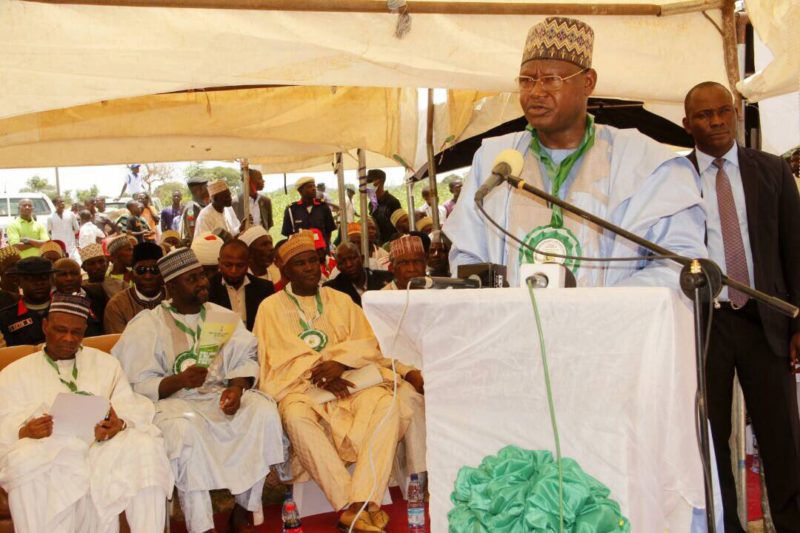Environment Minister of State, Ibrahim Usman Jibril, in Gombe on Wednesday, August 2, 2017 at the commemoration of the year’s World Day to Combat Desertification, Land Degradation and Drought, says that rising up to the Desertification, Land Degradation and Drought (DLDD) challenge is a prerequisite to achieving the nation’s commitments for climate change adaptation and mitigation, biodiversity conservation, forest cover and the Sustainable Development Goals (SDGs) targets

Desertification, Land Degradation and Drought (DLDD) negatively affects water resources, drives deforestation, food security; and contributes to environmentally induced migrations. DLDD is, therefore, amongst the most critical sustainable development challenges. It undermines government’s efforts in poverty eradication, fighting unemployment and enhancement of economic opportunities especially in rural communities.
This year’s theme: “Our Land. Our Home. Our Future” is a key for making Land Degradation Neutrality a fundamental solution for achieving the Sustainable Development Goals as adopted by the United Nations General Assembly in September 2015. Goal 15 of the Sustainable Development Goals calls on nations to protect, restore and promote sustainable use of terrestrial ecosystems, sustainably manage forests, combat desertification, and halt and reverse land degradation, as well as halt biodiversity loss.
This becomes our pillar for sustainable land management for agricultural productivity and shelter for our present teaming population and the future generations. Today, I urge cooperation among all actors to help achieve land degradation neutrality as part of a broader effort to achieve the Sustainable Development Goals and build a future of dignity and opportunity for all.
It is in this context that the World Day to Combat Desertification provides a unique occasion to remind all people that desertification and land degradation can be effectively tackled reminding us that solutions are possible, and that key tools to this aim lay in strengthened community participation and collaboration at all levels.
Land is a vital resource for producing food and other ecosystem goods and services including conserving biodiversity, regulating hydrological regimes, soil nutrients cycling, and storing carbon, among others. Indeed, the most significant natural capital asset is productive land and fertile soils. As people rely heavily on land as their main source for farming and housing, especially the rural poor, human well‐being and sustainable livelihoods are completely dependent upon and intricately linked to availability and productivity of the land. Land also is the major employer in most of human endeavours such as agriculture, geology, biology, architecture, town planning, transportation, just to mention a few.
If we do not rise to this challenge of DLDD, we will not achieve our commitments for climate change adaptation and mitigation, biodiversity conservation, forest cover and the Sustainable Development Goals targets; we will not effectively alleviate rural poverty and hunger nor ensure long‐term food security nor build resilience to drought and water stress.
This year’s WDD Commemoration advocates for the importance of inclusive cooperation on land management and contribute towards protective shelter for the present and future generations because land is a vital link to provide solutions to food security, housing, poverty eradication and employment generation.
The campaign: “Our Land. Our Home. Our Future” intends to promote public awareness in the implementation of the United Nations Convention to Combat Desertification in those countries experiencing serious drought and/or desertification, particularly in Africa. In compliance and effectiveness, the Federal Government has domesticated the United Nations Convention to Combat Desertification (UNCCD), United Nations Convention on Biological Diversity (UNCBD) and United Nations Framework Convention on Climate Change (UNFCCC). These are fallouts from the Rio Convention of 1992.
Since the catastrophic sahelian drought of 1972/1973, the government of Nigeria has regarded the challenge of DLDD as inimical to its national sustainable development that must be squarely addressed. Nigeria has developed numerous policy documents in the fight against DLDD and these include: National Policy on Environment, National Action Programme (NAP) to Combat Desertification and Mitigate the Effects of Drought. National Drought and Desertification Policy; National Drought Preparedness Plan; National Strategic Action Plan for the Implementation of the Great Green Wall for the Sahara and the Sahel Initiative, Nigeria Climate Change Policy and Response Strategy, National Adaptation Strategy and Plan of Action for Climate Change, National Forest Action Plan, National Conservation Strategy, National Biodiversity Strategy and Action Plan, National Resources Conservation Action Plan, National Policy on Agriculture, National Water Resources Master Plan, National Energy Policy, Nigeria National Environmental Action Plan (NEAP) and States Environmental Action Plan (SEAPs).
In its renewed commitment to fight desertification, land degradation and drought, this administration has recently signed agreement of permanent adhesion to the Sahara and the Sahel Observatory (OSS), an international organisation with the mandate of monitoring environmental changes and providing information necessary for formulating policies and programmes that can help in ameliorating the emerging environmental challenges. Information gathering for decision making is key in taking both proactive actions to ensure sustainable livelihood for the population.
The Ministry is currently piloting the Greening Programme as part of the move to protect and rehabilitate areas in hot spots. The planting of trees and other associated activities will provide measures to curb land degradation and to deal with impacts of climate change. The Ministry has invested on implementation of projects/programmes to curb the rampaging effects of these disasters in the country. These include but not limited to the establishment of shelterbelts, woodlots, orchards, acacia plantations to combat desertification and mitigate the effects of drought and climate change.
